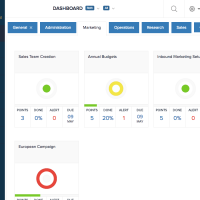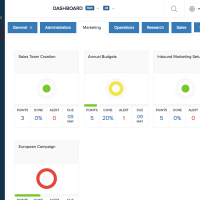Why is case and docket management so difficult for lawyers? Isn’t that what they teach in law school?
Insights
Workflows, Gantt charts, budgets, quality testing, production deadlines, deliverables, risk management — the list goes on. It’s no surprise that project management (PM) is one of the most lucrative professions out there; but with high reward also comes high risk.
The PMI’s 8th Global Project Management Survey found that “For every $1 billion invested in the United States, $122 million was wasted due to lacking project performance.” Another study by The Standish Group, found that “Fewer than a third of all projects were completed on time and on budget over the past year”.
The June jobs report is out, and it shows that U.S. employers increased the pace of hiring, a sign of continued labor market growth.
U.S. companies didn’t need to see the statistics to know that, in today’s labor market, they must work harder than ever to retain their workers.
And since millennials will make up more than 75% of the workforce by 2030, finding a way to retain that generation of employees is a major concern.
So why write an article about giving your millennial employees negative feedback? Because believe it or not, they want it!
You’ve done it all. You’ve optimized your workflow with Gantt charts. Your team is trained and geared up for Agile development.
Tasks are assigned, you’ve run the numbers, and you’ve projected an ROI that has the board eager to sign off.
The annual performance review is an excruciating ritual that has been around for a really long time, but, in 2017, it’s just not cool anymore.
It is a 20th century model that just doesn’t work for the 21st century. Managers see them as time consuming and not always reflecting employees’ real contributions. Employees, especially millennials, can find them demeaning and unfair.
But how can we provide the feedback that is essential to an employee’s growth without a review? And how can management gather and organize information on employee performance to use in human resources decisions?
What started as a management solution for complex software projects has rapidly grown across industries for companies both big and small.
The agile development process has taken CIO’s, CTO’s and Project Managers to new levels of productivity by embracing a culture of continuous change.
Program Management Offices (PMOs) have had to learn to evolve from a regular hierarchical reporting approach to the continuous change model that business demands today.
It has become the norm for businesses to incorporate a virtual workforce into their operations.
Whether a company has geographically dispersed offices, hires employees or freelancers in different cities or countries, or just offers local employees the flexibility to work from home, more and more of us are having to manage remote teams.
Results of a Gallup survey published earlier this year showed that 43 percent of employed Americans spent at least some time working remotely in 2016.
The Volkswagen emissions scandal figures prominently in the Catalog of Catastrophe that the International Project Leadership Academy has compiled of the most spectacular project management failures in the last 10 years.
The revelation that such a revered and trusted brand had taken previously inconceivable steps to deceive both regulators and the public in the name of profit margins was a shock to the world.
The worldwide cyberattacks in the news lately have worried businesses and individuals alike.
The ransomware attacks Petya and WannaCry have affected commercial businesses, governmental entities, and individuals by the thousands. But while the media focuses on these external attacks, internal network security threats remain one of the most common problems in security management.
Setting up a project management office is one the most effective things you can do to manage multiple projects around your organization. But it could become a big waste of time and resources if not configured properly.






